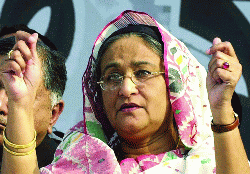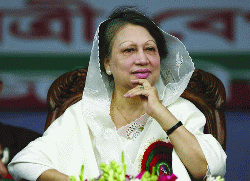Archives
Bangladesh curbing North East Rebels?
Bangladesh curbing North East Rebels?
 The fact that there has been a deeper conspiracy to upset the Hasina government and destabilize Bangladesh by fundamentalist, terrorist and extremist groups was more than clear with the findings of the investigation agencies linking these forces with the mutiny of Bangladesh Rifles in February last. 12 rebel groups were identified by the government which included Jameatul Mujahideen and Harkut-ul-Jihad Islami. Commerce Minister Col. Faruq Khan who coordinated with the intelligence agencies into the BDR mutiny expressed his concern
The fact that there has been a deeper conspiracy to upset the Hasina government and destabilize Bangladesh by fundamentalist, terrorist and extremist groups was more than clear with the findings of the investigation agencies linking these forces with the mutiny of Bangladesh Rifles in February last. 12 rebel groups were identified by the government which included Jameatul Mujahideen and Harkut-ul-Jihad Islami. Commerce Minister Col. Faruq Khan who coordinated with the intelligence agencies into the BDR mutiny expressed his concern
about the role of these groups. The home ministry sounded an intelligence alert about these outfits.
The other outfits named in the report were Hizbul Towhid, Ulama Anjuman al Bainat, Hizb-Ut-Tahir, Islami Democratic Party, Islamic Samaj, Touhid Trust, Jagrat Muslim Janata Bangladesh, Sahadat-e-al-Hikam Party Bangladesh, Tanira al-Din Bangladesh and Allah Dal. Of these, the government has already banned four outfits - Jagrat Muslim Janata Bangladesh, Sahadat-e-al-Hikam Party, Huji and Jameatul Mujahideen. Huji, a global terrorist group with Pakistani links, has been proscribed by USA.
Prime Minister Sheikh Hasina has issued orders tointensify the security vigil and directed the intelligence agencies to coordinate action against militant groups. Soon after coming to power, Hasina who herself survived two assassination attempts by such groups had indicated the resolve of her government to uproot militancy and track down their patrons and funding sources in line with her election pledge.
Her government later approved a tough anti-terror ordinance suggesting capital punishment of terrorists after speedy trials in special tribunals. Six top Jagrata Muslim Janata Bangladesh kingpins including its chief Sheikh Abdur Rahman were executed while Huji chief Mufti Abdul Hannan and some other members of his group were arrested to face justice.
The North East rebels too, according to sources from across the border, are feeling the heat of the tough stand taken by the new regime. Paresh Barua, Commander-in-Chief of ULFA, and Jeevan Singh, Kamtapuri Liberation Organisation supreme, are reportedly under detention. While Barua was taken into custody from Dhanmandi area of Dhaka, Singh was detained by police from a hotel in Rajsahi district. This crackdown in a select manner on top leaders has sent shivers down the camps, and bases of the rebel groups of the North East spread across the country.
Quite interestingly, leaders and activists of various insurgent groups have been arrested recently from metropolitan cities of India, enough evidence to indicate that their escape to and shelter in Bangladesh is no longer an option. The Dima Halam Daogah’s (DHD) Commander-in-Chief and Deputy Commander were arrested in Bangalore and its Foreign Secretary was killed in an encounter in Guwahati. Jewel Gorlosa, chief of the DHD, was held with two others in a joint raid by Assam and Karnataka police. With him was Deputy Commander in Chief Partho Warisa. After being tipped off about the movement of Frankie Dimasa, Foreign Secretary, and some other cadres of the outfit, Assam police cordoned off the thinly populated Bishnu Nagar hill area of Guwahati. In the encounter that followed, Frankie was killed while others managed to flee. Gorlosa had traveled from Kathmandu to Bangalore and was trying to get an Indian passport.
 Close on the heels of these developments came the arrest of a top leader of Manipur based Kanglei Yawol Kangla Lup (KYKL) R. K. Raghunath along with an award winning film actress of the state Devika Devi from a New Delhi guest house in South Extension area. Four senior extremists of Kangleipak Communist Party were arrested in the national capital and two activists of this outfit were nabbed in Bangalore. Similarly, security forces arrested some PLA cadres in Mumbai and Kolkata.
Close on the heels of these developments came the arrest of a top leader of Manipur based Kanglei Yawol Kangla Lup (KYKL) R. K. Raghunath along with an award winning film actress of the state Devika Devi from a New Delhi guest house in South Extension area. Four senior extremists of Kangleipak Communist Party were arrested in the national capital and two activists of this outfit were nabbed in Bangalore. Similarly, security forces arrested some PLA cadres in Mumbai and Kolkata.
In the wake of these arrests and detentions, much sensation has been created over the statement of former chief of Director General of Field Forces Intelligence of Bangladesh in the ongoing trial of offenders in Chittagong court to the effect that the ISI of Pakistan had sent a huge consignment of arms and ammunition worth crores of rupees for the ULFA in direct collusion of the Bangladesh army and intelligence officials during the Khaleda Zia regime. At the behest of the ISI, he further stated that Tareq Rahman, son of Khaleda Zia, former Prime Minister, and the then Deputy Home Minister, Lutfuzzaman Babur had held secret meetings with Paresh Barua.
On the basis of these confessional statements, Sahabuddin, the then Director of the National Security Intelligence of Bangladesh, was taken into custody. Bangladesh Nationalist Party and its ally Jamaat-e-Islam were in full privy of the smuggling of arms and ammunition to help the dreaded militant outfit of the North East. According to his statement, the ISI purchased arms and ammunition from China and then shipped them to Chittagong port. ISI leader Major Gen. Ehsanul had mediated with ULFA leader Paresh Barua on the matter.
A series of meetings were held in Dhaka to decide about the modus operandi to deliver the consignments to ULFA bases in Assam. The meetings were attended by top ISI, DGFFI officials and ULFA leaders, besides business magnets. Sahabuddin also made the sensational disclosure that Rs.1.5 crore was earmarked as incentives to police officers and other assistants in facilitating the arms deal. But, the ISI instead took away the entire amount. Thus, disgruntled police officers leaked out the game plan of the ISI.
From the two ships anchored at Chittagong port, arms and ammunition were loaded into ten trucks when the security and intelligence agencies swooped in and arrested the persons involved in the shady operation. Both the ships belonged to Salauddin Kader Chowdhury, Parliamentary Affairs Adviser to Begum Khaleda Zia and also a BNP party leader. In the meantime, the Government of India has demanded repatriation of top ULFA leaders Arabinda Rajkhowa, Paresh Barua and Anup Chetia. New Delhi is confident of positive steps by the Awami League led government. Once it happens, it will open a new vista in the Indo-Bangla relationship.

